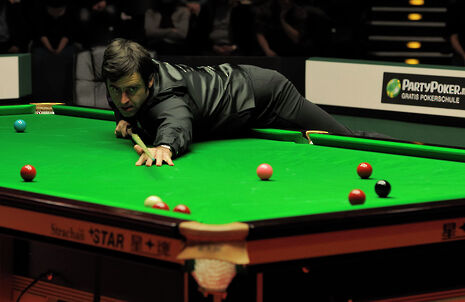Why Ronnie O’Sullivan is a threat to snooker
Gabriel Gendler discusses the consequences of The Rocket’s domiance

‘Remarkable’ would be a fitting adjective to describe Ronnie O’Sullivan’s sixth victory in a Masters Final. ‘Painful’ would be more fitting still. The Rocket, as O’Sullivan is colloquially known, dropped a solitary frame to an underwhelming Hawkins before winning the requisite ten on the trot. When he produced a stylish 136 in the third, Alexandra Palace erupted. When a wayward pink sank out of pure luck to award him the ninth, the discomfort was audible.
His dominance is virtually unparalleled in any sport. Even before last week he had won each of the Triple Crown events on five occasions. He holds the records for the longest winning streak, the most competitive centuries and the most competitive maximum breaks, including the three fastest in history. His records cover every aspect of the game, and are all the more remarkable for the fact that he has achieved them despite a long history of false retirements, long sabbaticals, depression and drug-related issues. On the rare occasion that he loses, it’s because his mind is elsewhere. On form, he doesn’t lose at all.
The Rocket raises difficult questions for the sport. On some levels, he can only strengthen it; he is a pleasure to watch, and sessions in which he plays are invariably sold out. In a more abstract sense, he makes a farce of snooker. We are entertained, because we are attracted to talent and genius, but the higher form of entertainment through sport - the dialectic, the battle of wits, the manoeuvring and predicting - leaves the Crucible when Ronnie enters it. Instead of the thought-provoking psychological thriller that it should be, snooker is a feel-good American college flick about a fraternity of one.
This is not a fate to which all sports are vulnerable. When Barcelona dominate club football, their tougher fixtures don’t become routine. Each challenger brings a game plan, and the champions must respond. Federer’s reign in tennis was soured by his head-to-head inferiority to Nadal. The rapid exchange of movements, decisions and ideas that comprise most confrontational sports means that the strength of an individual or team does not compromise the entertainment value of each encounter.
There was no such dialectic on Sunday. In each frame, Hawkins played a few shots, and then gave way for a solo performance from O’Sullivan. Snooker admits some degree of confrontational play, in the form of shot selection, but it is a solo sport compared to football or rugby. Indeed, the disciplines that focus primarily on the individual are precisely those that find themselves in the condition that snooker finds itself in now. Tiger Woods monopolised golf for a decade. So did Roger Federer and Michael Schumacher in tennis and Formula 1 respectively. Athletes and swimmers can dominate their events for years - Michael Phelps is the obvious example, but not the only one. In contrast, winning the Premier League ordinarily involves winning only two out of every three matches.
There is a great deal of value in sports that place a premium on individual performance. These are the contests that test an athlete’s mental resources, require remarkable physical achievements and produce inspirational champions. They are more inclusive; it is easier to go for a jog than to organise a game of rugby. Nevertheless, when talented outliers like O’Sullivan turn up the sport itself becomes vulnerable – and snooker is under rocket fire.
Should we be worried? There are enough reasons to be cheerful. Today we can enjoy a master at work - and eventually, everyone will be defeated by time.
 News / Fitz students face ‘massive invasion of privacy’ over messy rooms23 April 2024
News / Fitz students face ‘massive invasion of privacy’ over messy rooms23 April 2024 News / Climate activists smash windows of Cambridge Energy Institute22 April 2024
News / Climate activists smash windows of Cambridge Energy Institute22 April 2024 News / Copycat don caught again19 April 2024
News / Copycat don caught again19 April 2024 Comment / Gown vs town? Local investment plans must remember Cambridge is not just a university24 April 2024
Comment / Gown vs town? Local investment plans must remember Cambridge is not just a university24 April 2024 News / Cambridge University disables comments following Passover post backlash 24 April 2024
News / Cambridge University disables comments following Passover post backlash 24 April 2024





